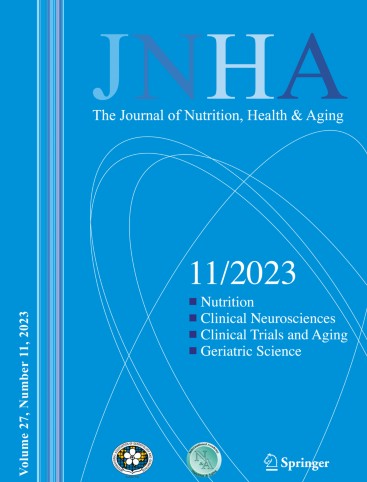日本40-74岁社区居民绿茶消费与痴呆风险:一项为期12年的队列研究
IF 4
3区 医学
Q1 GERIATRICS & GERONTOLOGY
引用次数: 0
摘要
与咖啡一样,绿茶被认为可以预防痴呆症,但缺乏支持证据。目前的研究旨在确定绿茶消费与中老年人患痴呆症风险之间的独立联系,以及绿茶和咖啡消费与痴呆症风险之间的相互作用。方法本研究是对Murakami年龄相关疾病队列研究的12年随访。参与者13660人(男性6573人[48.1%];平均年龄59.0 (SD = 9.3)岁,年龄在40-74岁之间。基线调查在2011 - 2013年间进行。一份自我管理的问卷获得了预测因素的信息,包括性别、年龄、婚姻状况、教育程度、职业、体型、体育活动、吸烟、饮酒、茶和咖啡消费、能量摄入和病史。用一份有效的问卷定量地确定了绿茶的消费量。使用长期护理保险数据库确定偶发性痴呆病例。结果较高的绿茶摄入量与较低的痴呆风险比(HRs)相关(趋势的多变量P = 0.0178),最高四分位数的风险比(调整后的风险比= 0.75)低于最低四分位数。饮用一杯绿茶(1杯= 150毫升)导致痴呆的调整后风险比为0.952 (95%CI:0.92 - 0.99),相当于每增加1杯减少4.8%。大量饮用绿茶和咖啡与低痴呆风险无关(相互作用P = 0.0210)。结论:绿茶的高摄入量与痴呆的低风险独立相关。虽然绿茶被发现是有益的,但不建议过度饮用绿茶和咖啡来预防痴呆症。本文章由计算机程序翻译,如有差异,请以英文原文为准。
Green tea consumption and dementia risk in community-dwelling Japanese people aged 40–74 years: A 12-year cohort study
Objective
Green tea, like coffee, has been suggested to protect against dementia, but supporting evidence is lacking. The present study aimed to determine independent associations of green tea consumption with, and interactions of green tea and coffee consumption on, dementia risk in middle-aged and older people.
Methods
The present study is a 12-year follow-up of the Murakami cohort study on age-related diseases. Participants were 13,660 (men, 6,573 [48.1%]; mean age, 59.0 (SD = 9.3) years) community-dwelling residents aged 40–74 years. The baseline survey was conducted between 2011−2013. A self-administered questionnaire obtained information on predictors, including sex, age, marital status, education, occupation, body size, physical activity, smoking, alcohol, tea and coffee consumption, energy intake, and medical history. Green tea consumption was quantitatively determined with a validated questionnaire. Cases of incident dementia were identified using the long-term care insurance database.
Results
Higher green tea consumption was associated with lower hazard ratios (HRs) for dementia (multivariable P for trend = 0.0178), with the highest quartile having a lower HR (adjusted HR = 0.75) than the lowest quartile. The adjusted HR for dementia by cup-based green tea consumption (1 cup = 150 mL) was 0.952 (95%CI:0.92−0.99), corresponding to a 4.8% reduction per 1 cup increase. High consumption of both green tea and coffee was not associated with low dementia risk (P for interaction = 0.0210).
Conclusion
Higher consumption of green tea is independently associated with a lower risk of dementia. Although green tea was found to be beneficial, excessive consumption of both green tea and coffee is not recommended for the prevention of dementia.
求助全文
通过发布文献求助,成功后即可免费获取论文全文。
去求助
来源期刊
CiteScore
7.80
自引率
3.40%
发文量
136
审稿时长
4-8 weeks
期刊介绍:
There is increasing scientific and clinical interest in the interactions of nutrition and health as part of the aging process. This interest is due to the important role that nutrition plays throughout the life span. This role affects the growth and development of the body during childhood, affects the risk of acute and chronic diseases, the maintenance of physiological processes and the biological process of aging. A major aim of "The Journal of Nutrition, Health & Aging" is to contribute to the improvement of knowledge regarding the relationships between nutrition and the aging process from birth to old age.

 求助内容:
求助内容: 应助结果提醒方式:
应助结果提醒方式:


